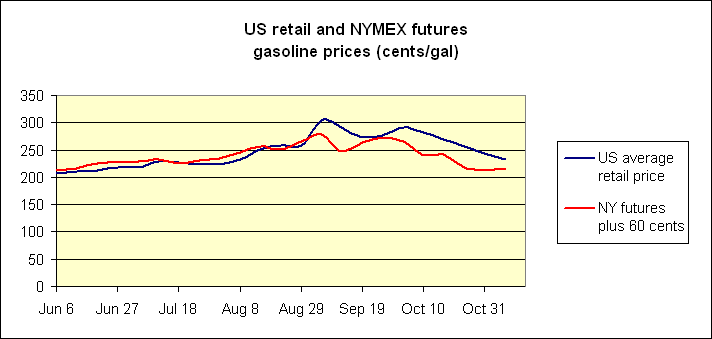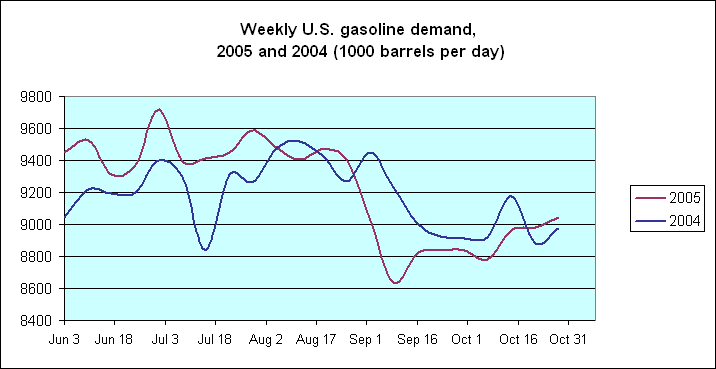Gas prices have dropped a lot, and further declines are in sight. What’s that mean for fuel demand and the overall economy?

Retail gasoline prices nationwide have fallen 70 cents per gallon from their September highs and are now back to the values from early August. The near-term NYMEX gasoline futures contract is down to values not seen since the beginning of summer, suggesting that another 10 cent drop or more in the retail price could be coming soon.

And what about gasoline demand? We don’t have direct daily observations on how much gasoline American consumers are burning in their cars, but we do know how much gets purchased by wholesalers, and ultimately that ends up getting used by consumers. The above graph reveals that a very dramatic drop in gasoline sales relative to the previous year accompanied the high gasoline prices of September. Although there is a lot of noise in the weekly values for this series, it is interesting to note that this trend has recently been reversed, with demand for each of the last two weeks higher than it had been in the corresponding weeks of the previous year.
Does this mean we’re back where we started in terms of gasoline demand? I would be quite surprised if that proves to be the case. The change in the car-buying habits of the U.S. public has been pretty dramatic. This is the kind of change that will continue to influence gasoline demand for many years to come, as older cars are gradually replaced with more fuel-efficient models. The move away from SUV’s was in fact incipient at the start of the year, but the money-losing dealer incentive programs temporarily reversed that trend this summer. The American public did not give up on the big cars very easily, but now that sentiment has shifted, it would be surprising if we moved back again any time soon.
If the oil shock from Katrina is now over, does that mean that we’ve dodged the bullet of an economic downturn as well? This is far less clear to me. The other shoe of employment losses in autos, airlines, and tourism has yet to drop. The economic consequences of previous oil shocks often took more than half a year to become fully apparent, and key economic indicators continue to paint a very mixed picture at the current time. I therefore remain of the view that things could easily go either way from here.
Technorati Tags: gas prices,
gasoline prices,
gasoline demand,
oil prices, oil, petroleum demand,
recession,
Katrina
If the oil shock from Katrina is now over, does that mean that we’ve dodged the bullet of an economic downturn as well?
::::
I think debt load will be a bigger drag on the economy than energy… increasing debt service & flat wages for workers in the middle of the income curve… especially if the household ATM falters at all.
anyone have stats on trends in aggregate credit card and revolving debt balances in the U.S.?
The other shoe waiting to drop is the home heating bills that most people have not figured in yet. It is true that oil and gasoline prices have been falling, but that does not seem to have been the case much so far for natural gas prices, which are very important for home heating. The temperature has been warmer than usual on the east coast (saved by global warming?), but Christmas shopping could really take a hit.
Natural gas seems to be a bigger problem. Prices are somewhat lower now but still dramatically higher than in the beginning of the year. Here the demand curve seems to be much more rigid. This is hurting housing and manufacturers.
Blogosfera
* Marginal Revolution esclarece um pouco sobre um senso comum bem ruinzinho: o de que McDonald’s é a causa da obesidade norte-americana. Coisa de gente pouco séria como Michael Moore (eu acho que você pode criticar/elogiar Bush, Zico ou Maradona:…
I agree with dryfly regarding the drag of debt. At the automotive consumer level in the last few years the average repayment cycle on an auto loan has increased to over 60 months. Low down payments have increased the average amount financed to 101% of the vehicle price. I see more debt consolidation loans, home equity loans, and absurdly long term leases than ever before. Damaged credit lenders now capture a much larger % of the market even though captive finance companies are taking greater credit risks themselves. All of these factors force some willing consumers to the sidelines.
The focus is now on energy but the reality is that the energy “problem” has already been solved. Even Syria and Russia are getting together to build a refinery. We are on the way back to $40 oil. This winter will be tough on consumers and next summer the driving season will be tough but the general direction is toward $40.
The oil price certainly did remarkable damage to consumer confidence which is at recession levels. However, small business confidence is strong and is projecting a strong GDP of as much as 4% in 06. So it looks like a slow down trough the winter with gaining economic stength throughout 2006.
Consumer debt always gets crowded out once the expansion phase is underway. So, yes, the consumer will, on balance, pay down debt over the next several years. Wages and salaries will be up, interest rates will be up and the natural thing to do will be to pay off debt. Corporations, on the other hand, are going to spend some of the cash hoards and finance new plant and equipment.
Back to the original question, lower gasoline prices will gradually restore consumer confidence but gradually is the key word; don’t count on a great holiday retail season.
Nate:
According to today’s Wall Street Journal:
September ’05
Nonrevolving credit (car loans, etc.) down $3.2 billion
Revolving credit – up by $3.1 billion
3rd Q ’05
Consumer credit – up by 3.3% annual compared to 4% in prior quarter.
Revolving credit – up 2.7% compared to 4.6% in prior quarter.
Non-revolving credit – up 3.7% vs 3.6% in the prior quarter
I agree with the previous posters about natural gas as the bigger concern. In the papers here, gasoline prices have retreated to the back pages of the business section. Home heating costs, forecast to be anywhere from 30% to 70% higher than last year, are still hitting the front page every few days. Electricity prices are also affected, since much of the generating capacity that has been added in recent years is gas-fired.
You guys are forgetting that when gas hit $2/gallon on the way up, people figured it was a spike, and that the plateau was $1.
Now that it hit $3 and is headed back down, people are figuring that the plateau is $2.
The difference between those plateaus is the diference between buying an SUV and buying a more sensible vehicle (car).
I think people actually have become acclimated to $2.50 a gallon, and if there proves to be some stability in that price range, they will continue to choose their purchases primarily based on other criteria. Consumer confidence seems to be rattled more be uncertainty and fear. No one wants to be perceived as a bad decision maker.
“Does this mean we’re back where we started in terms of gasoline demand? I would be quite surprised if that proves to be the case. The change in the car-buying habits of the U.S. public has been pretty dramatic. This is the kind of change that will continue to influence gasoline demand for many years to come, as older cars are gradually replaced with more fuel-efficient models.”
I don’t think things have changed that much. It takes many years to substantially alter the average mileage of the vehicle fleet. Sure, not as many people are buying SUVs these past few weeks and months, but it’s going to take years before that has a significant effect.
In the meantime, just as high prices reduced demand, low prices will increase it. That’s exactly what we are seeing in the graphs above. I expect this to continue, gasoline prices will continue to fall and demand will continue to rise above last year’s level (due to economic growth). So far supply is keeping up OK.
Next summer things may be different; as the driving season hits we may see another supply crunch, with high prices and reduction of demand. But for now I’d say that the crisis is behind us and gasoline demand will continue to rise well above last year’s level.
Bill-
thanks-
does “prior quarter” mean Q3 2004 or Q2 2005?
This sums it up. Europe has been sending us gasoline from their refineries. This is about to stop. Look for $2.60 to $2.75 in a month.
http://www.321energy.com/editorials/kunstler/kunstler110905.html
Nate:
Prior quarter was Q2 05
Bill
Nate
Pct changes are in annualized terms.
I wonder if Dr. Hamilton would like to conjecture if the like brought up by Jim (3 posts above) is likely the principle issue in the drop of gas prices in the past month.
Thanks.
The Student:
None of us knows for sure where gas prices will be next month. When I look at the NYMEX futures, I see that the market is betting against $2.60 retail. Retail gas prices seem more likely to go down than up from here. But the market has been wrong before and could certainly be wrong this time.
I believe there are some longer run forces at play here and it may be a mistake to focus too much on Katrina and its aftermath at this point.
JDH,
What are you using for reference. I haven’t check gasoline commits, but the commitment of traders suggests that we are at or near a bottom in both heating oil and crude oil markets. This is based on the very high net long position of commercial traders (smart money) and very high net short position of speculative traders (dumb money). Those whose business it is to buy energy when it is on sale and sell it when it gets expensive do not agree with your analysis.
Skoobz:
Historical retail prices are from EIA here. Historical futures prices are from EIA here. The most recent futures price as of the time you read this can be found from NYMEX here.
i think historical crude price data is pretty much an irrelevant indicator taken alone, or simply as a comparison to today’s prices. follow the commercials in the futures market and see where they are placing their bets. they are big time net buyers.
Skoobz, I’m talking about prices right now. Right now (2:00 p.m. PST, Nov. 10, 2005) you can buy gasoline for December delivery at $1.50 a gallon. That’s what the smart money is actually betting, regardless of what you may have read or heard elsewhere. Add about 60 cents a gallon to get what that means in terms of average national retail price.
Here’s my comment on The Oil Drum, “Kunstler vs The Market”, http://www.theoildrum.com/story/2005/11/9/114426/199#23.